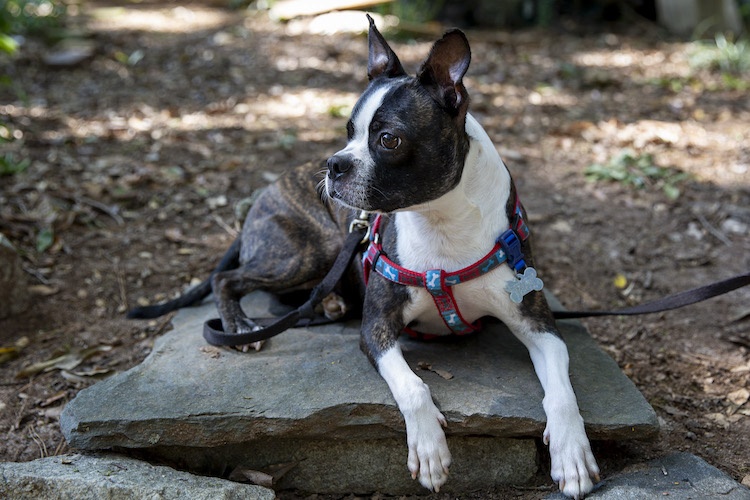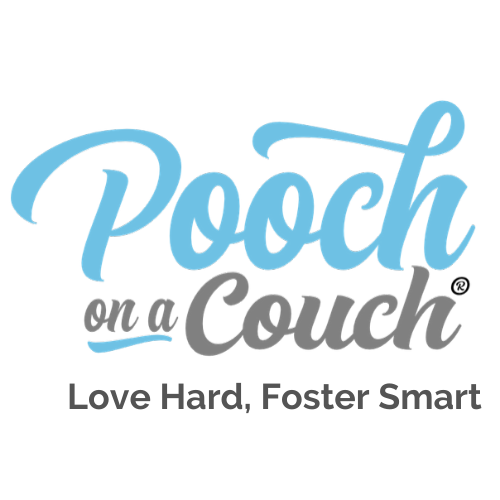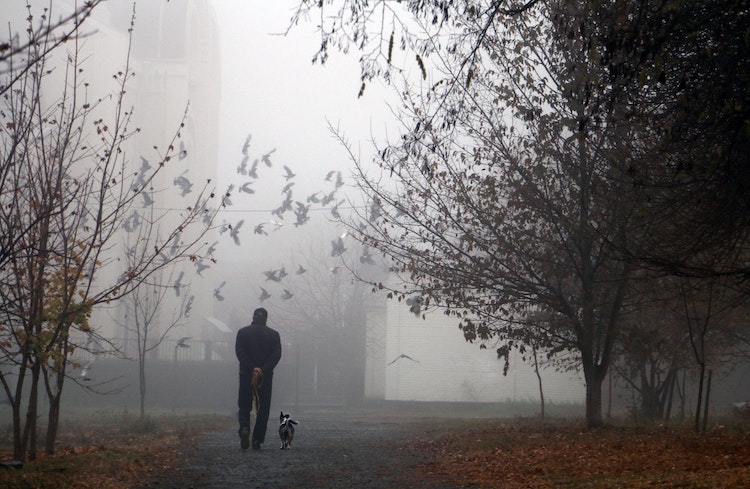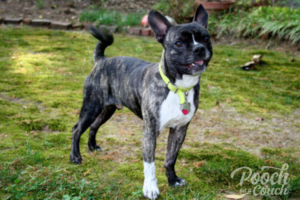I spent some time with my dog trainer a few months back to talk through a little behavior my foster dog, Carter, exhibited toward a few guests in my home. Because I was preparing to send Carter to a new home for adoption, I wanted to make sure that I was equipped with the best knowledge and advice so his transition to a new life was smooth and his new humans had their perfect match.
I knew Carter and I knew the dog adoption home he needed. That was the easy part.
“Is this the dog they want?” she asked. I sat back in my chair.

I thought for a minute – Boston. Little. Not dying.
But that’s all I really knew. The dog adoption form was lacking in thought-provoking and open-ended questions.
The application told me this family had the things Carter needed, but I didn’t know if Carter would provide them with what they needed and wanted.
I knew they were ready to adopt a new dog after the passing of their most recent pet. But “ready” didn’t tell me diddly squat about the kind of dog they were looking for.
Damn. Such a simple, straight forward, respectful question.
What kind of dog do you want?
I fumbled a minute and said, “I think they want a companion dog.”
I didn’t really know. Is this the dog they want? What does a companion dog even mean? It’s certainly different for every person. One person considers a companion dog one that sleeps at his feet. Another considers a companion dog one that is kissy-kissy and snuggly. Or a dog that wants to train and work.
Is Carter the dog they want? In all honesty, I don’t think we’ve talked that through, yet. Are they willing to accept or polish up the things about Carter that are less than perfect? What am I willing to accept? Am I willing to, at the last minute, say this dog adoption is a no-go?
Why didn’t I already have the answers to these questions?
Ask Families About The Dog They Want
I’ve been thinking on this question: Is this the dog they want?
How do we get that answer?
Are we asking the right questions? Who in your agency asks the questions? You? Someone else? Is there a team approach?
Is our dog adoption application asking the right questions in the right format? Are we concerned an application requiring a paragraph will cause some to not apply? Is the question best answered in an interview?
Are we stretched so thin that we don’t have the interest or time to participate in an engaging interview, conversation style? Have we even been trained in interview techniques?
Are we winging it, hoping the family falls head-over-heals for the dog we suggest and decides to “take one for the team?” Are we OK with putting our dogs through multiple trial runs?
Do we understand the angst a family experiences when they make the right decision and return a dog to rescue? Are we kind to them when they do?
Do we have follow-up conversations with adopters after the fact and ask the hard question: Did we place the dog with you that you want? Was this the dog they wanted? What is our follow-up schedule? 24 hours? 1 week? 1 month? A year? Longer?
Are we interested in our dog adoption statistics? Do we have the ego to ask our adopters to complete a satisfaction survey 6 months, 1 year, 5 years after adoption?
So many questions.
Help A Person Discover The Dog They Want
Recently, I volunteered to do a home visit for a single, young lady who’d taken interest in a dog posted on a dog adoption platform. He was physically disabled, but young and adorable. She was already making plans for their life together.
This dog also had issues with men.
As we got to talking, she disclosed that she indeed wanted to have a male companion in the future. [cue sound: screeching brakes] I asked her what she thought her life would be like with this dog who didn’t like men when she began to date again?
She hadn’t thought about that.
The dog adoption coordinator was grateful for this extra information and agreed that a different dog would be a better fit. I’m hopeful the young lady will soon get the dog she’s always wanted, not just one she has to cope with.
The Adopter Gets To Say ‘This Is The Dog I Want’ – Sometimes.
The adopter gets to drive the decision on which dog they want to adopt.
With our help.
An adopter does not get to say “this is the dog I want” when we know good and well that the dog they are wanting is a poor fit.
Many times, this requires extra work on our part, and an adopter’s willingness to be forthcoming and introspective. It means that before we stamp a checklist-style dog adoption application “APPROVED TO ADOPT ____” we build a relationship with the adopter. We understand their lifestyle, future goals, how they expect a dog to fit in their life, and their current skills as a dog owner.
When we know lifestyle, we can make better matches.
Get Nosy!
I once asked a newly married couple if they planned on having children.
Imagine their reaction!
“I’m not trying to pry into your personal life,” I said. “However, a dog may be in your life for 10, 15, 20 years. I want the dog you adopt now to be a dog that will adapt to children in your home.”
This opened up a conversation on ways families can begin to ready their pets for the arrival of a baby and all the noise, new smells, change in routine, and yes – anxiety – that a new baby can bring.
Be Intentional, Not Pushy
I do not have the art of manipulation. I can’t sweet talk a friend or neighbor into taking a dog before they are over the loss of their beloved pet. Or talk someone into taking a second dog when they are perfectly happy with just one. I know rescuers who can – and do.
I wonder how many of those adopters feel gently sucker-punched as they tentatively pet their fearful dog or break up a squabble over a toy or secretly wish their common brown dog was more of a Labrador. Love and disappointment can cohabitate.
I don’t want my adopters to be disappointed or feel like they are stuck with a dog or fear guilt or shaming should they return a dog that ended up not being a good fit. By the same token, I don’t want a dog placed and then returned 5 times. I’m not adopting out sweaters.
I am also fully aware that no dog comes with guarantees.
People Will Seek The Dog They Want.
I’ve talked with several people who have taken in a “special” dog, dug deep, “did the right thing,” loved that neurotic mess until its life end, and returned to rescue for a more normal dog. Or, they bought a puppy. Damn right, they wanted a more normal dog. Special dogs can be hard. 10, 12, 15 years is a long time. Proper rehabilitation training isn’t cheap.
There are special people out there who love special needs dogs, hallelujah.
Special dogs are not for everyone. I really hope we don’t guilt someone into adopting a dog they are not prepared for, equipt for, or want to care for.
“This Is Rescue! What Do People Expect?”
Save it, warriors. I am not poo-pooing the responsible placement of special needs dogs. I know special dogs need homes, and friends can step up after we twist arms to get them to take another – and another. Homeless dogs need homes. Dangerous dogs do not.
What I’m asking is………..
Why shouldn’t an adopter get the dog they want?
Shouldn’t we want an adopter to get the dog they want? Shouldn’t we ask?
Shouldn’t we work to understand what they want in a dog first and ask about the fenced back yard or timely vaccines further down the application?
A Family-Centered Shift That Benefits Dog, Family, and Community.
I don’t know that I have advice or suggestions or recommendations or some bullet point list for you.
I do challenge you and your rescue agency to do a systems review of your dog adoption form/content, process, staffing needs, training needs, and data collection.
Your job as a dog rescuer is to guide the successful and responsible placement that benefits the dog, the family, and the community.
It is not to simply save a life.
Ask these questions:
- What is the perfect home/lifestyle for this dog?
- What is the perfect dog for this family’s home/lifestyle/skill?
- How does the family’s community support this dog? Is it quiet? Busy? Congested? Sparse?
Let me know your thoughts. How do you ask this question? What answers do you get? Do you find people may not really know what kind of dog they want, and how do you help them figure that out? How long does that process take? Can it be accomplished at an adoption event? How hard would it be to keep data on our adoption stats? 6 months, 12 months, 5 years later? How many of your dogs are still in the same household 5 years later?




